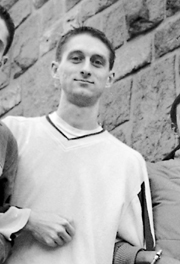
Chris Schulz
|
by Sigalit Hoffman
Chris Schulz, head of the Representative Union slate, has promised to
take office today, despite the fact that a ruling on the legality of the
November student election is not expected for about two weeks.
“As far as we’re concerned, the Representative Union is not
waiting for any ruling, since the contestation process set out in the
CSU bylaws has not been followed,” Schulz said.
Jessica Lajambe, the chief electoral officer, received 85 complaints and
two election challenges, so she asked the university’s four-member
judicial board to decide whether the mid-term election was legal.
“I can’t ignore the severity of the contestations,” Lajambe
said. “To make a decision would have been irresponsible towards the
defendants.”
The head of the Representative Union called Lajambe’s move to pass
the decision on to the judicial board illegal, but Lajambe defended her
decision saying the CSU election bylaws were “outdated” due
to the special circumstances of the election.
“They didn’t hold [up] well in the legal sphere,” she said.
“Had my decision not been favourable to the [RU] party, it would
have been contested anyway.”
Lajambe investigated the complaints and wrote a report of her findings,
which the CSU was scheduled to review at its meeting last night. Lajambe
said the election had been “messy.”
“I hope this will be an eye-opener for council — I hope they
take note of the election discrepancies,” she said. Lajambe recommended
remodeling the CSU election bylaws based on the federal electoral system.
Schulz said that according to the student union’s own constitution,
the newly elected council is supposed to take office once the council
receives the report. “We’re expecting the CSU to adhere to its
own bylaws,” he said.
Schulz won the election with 45 per cent of the vote, but his campaign
was mired in controversy after his party was accused of improper communication
with another slate. The allegations led the CEO to temporarily bar the
Representative Union from the running.
Lajambe reinstated the party hours later, and had to extend the election
to give the voters who had been presented with a truncated ballot the
chance to vote again. The election proper was Nov. 27 to 30, and the special
election was Nov. 29 to Dec. 5.
The Umbrella Party, led by Zev Tiefenbach, came in second with about 38
per cent of the vote. About 3,600 Concordia students voted, surpassing
last year’s record turnout by one third. However, almost 21,000 students
were eligible to vote.
In the meantime, Schulz has sent a lawyer’s letter to interim CSU
president Patrice Blais to protest the temporary three-member executive
council he formed. Blais, who was vice-president finance, stepped in when
Sabrina Stea resigned as president just before the election. Stea was
subsequently elected to the CSU Council of Representatives in the by-election.
“According to the bylaws, the interim presidency ended once the by-elections
were held,” Schulz said. He called the move a ploy to allow Blais
to hang onto the presidency.
President-elect eager to take
office
Chris Schulz, the president-elect of the Concordia Student Union, wants
to make the CSU more accessible to students and more cooperative with the
administration.
“We want to reach out to students,” Schulz said. “It shouldn’t
take 30 days of stopping by and hoping to catch a member of the executive.
It should be a matter of dropping by or making a phone call.”
Schulz said the preceding executive suffered from a “deficit of legitimacy”
in the eyes of its constituents because it didn’t respond to their
needs.
He also wants to build a dialogue with the university through the Dean of
Students. “A hostile, confrontational relationship isn’t constructive,”
he said.
Schulz hopes to start a student services fund that will help students gain
access to campus resources. The fund will help students rent audio-visual
equipment as well as the Oscar Peterson Concert Hall or the D.B. Clarke
Theatre. Though Schulz will have a very short term as president — just
this term — he hopes to at least lay the foundation for the completion
of his projects.
He said his most pressing project is repairing the university’s public
image. “We feel it’s very important to undo the damage that’s
been done.” Schulz is planning a massive drive for food and clothing
for needy Montrealers if he enters office.
Schulz was elected with just over 45 per cent of the vote, but complaints
about the election might jeopardize his presidency. He promises to honour
the results of the student referendum if the university’s judicial
board accepts his nomination.
“We have a mandate to address every [referendum question] that passed
and to take measures towards their eventual completion,” he said. The
results included democratizing the position of the Dean of Students, and
demanding that the university repeal its decision to exact a 1.61 per cent
“bad debt” fee on the funds of money transferred to several student
groups to cover the costs of those students who default on payment of their
student fees.
Schulz is upbeat despite the controversy surrounding the election, which
drew in about 3,600 voters.
“We doubled last year’s turnout, and raised the record CSU turnout
by one third,” he said. “This is a big step for students, it’s
a positive one, and it’s only going to go up from here.”
|
|
|



